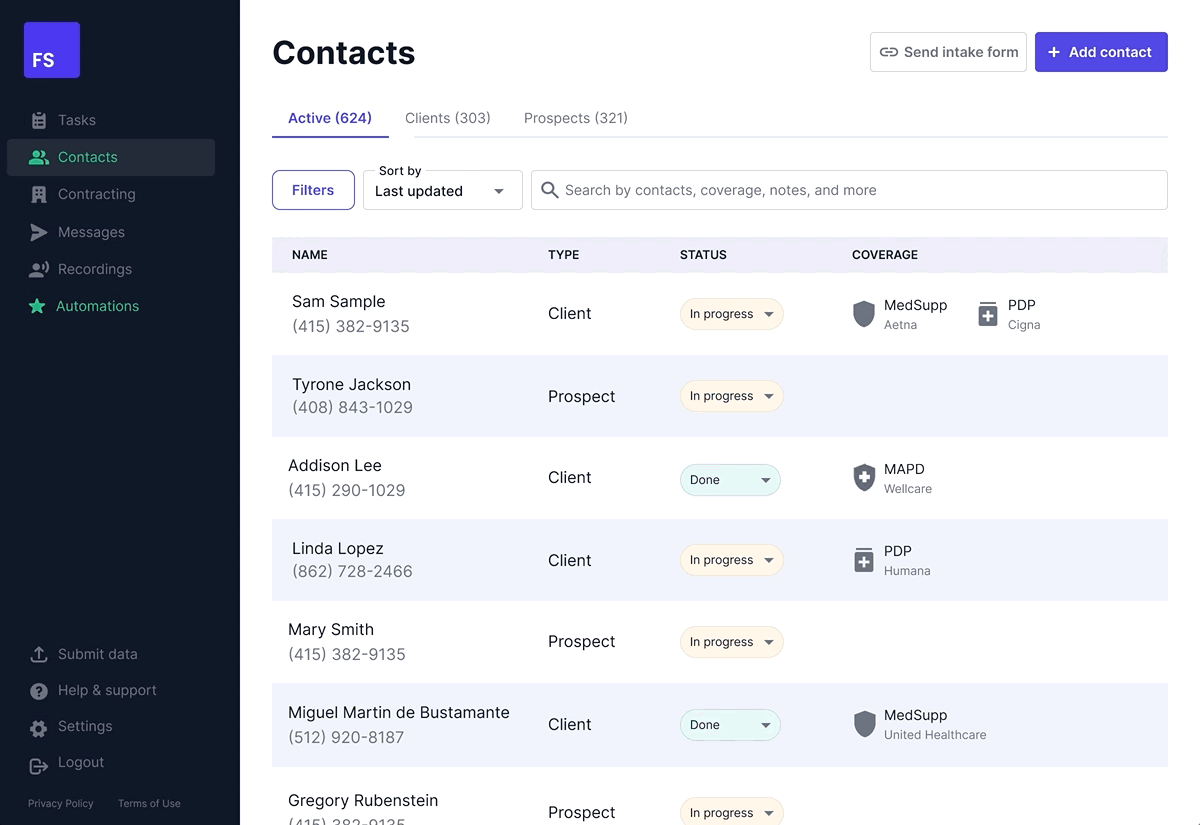FairStreet

Process
FairStreet was a seed-stage startup focused on building a CRM for Medicare agents and their 65+ clients. As the founding designer and employee #3, I was responsible for developing the design strategy and the CRM itself. I collaborated closely with a small team of seven: the CEO, CTO, two engineers, a PM, a customer success manager, and a sales lead.
CRM (Customer Relationship Management)
At its core, FairStreet managed client data, with the main page displaying key coverage information and easy access to detailed client profiles.
Automations
I spearheaded a strategic initiative to transform FairStreet from a simple data tool into a comprehensive business management solution. Automations were key to this, saving agents time by handling repetitive tasks.
I conducted a comparative analysis of automation tools like Hubspot, Customer.io, Honeybook, and Airtable, discovering varying levels of complexity. User research revealed that agents found branching logic overwhelming—they needed simple automations, such as sending birthday emails to clients. After exploring two design options (sidebar and in-context), I chose the in-context approach, as it provided better workflow visualization, which was crucial given the limited screen space on agents' laptops.
SOA (Scope of Appointment) Form
I designed the Scope of Appointment form to help insurance agents comply with Medicare regulations. To ensure its accuracy, I proactively reached out to United Healthcare's VP of Compliance on LinkedIn for validation.
One agent’s enthusiastic feedback highlighted the impact:
"I just saw that the SOA has been added! I can hardly wait to start using it with all my prospects. Thank the team SO much!!! 🙂 (can you tell I am excited?)"
Newsletter Editor
To help agents stay in touch with their clients, I designed an in-app editor for creating quarterly newsletters. Post-launch, newsletters accounted for more than 30% of all emails sent from the CRM, underscoring the feature's success and value.
.png)






Result
In a bittersweet conclusion, FairStreet ultimately shut down due to challenges in customer acquisition. We discovered that Medicare agents value personal relationships with agency staff more than they do technology. One agent encapsulated this sentiment perfectly: "I've been working with Jimmy at my agency for over two decades. Your software is the best I've seen, but I can't turn my back on Jimmy."
Despite the outcome, I’m grateful for the invaluable lessons I gained from this startup journey:
- "Constant vigilance" is wise – as famously quoted by Mad-Eye Moody in the Harry Potter series. I joined FairStreet during open enrollment, a period of high daily usage that led the team to mistakenly believe we had achieved product-market fit.
- Good software doesn’t always equal good business. In one of our final efforts, we cold-called potential customers, only to find that while agents loved FairStreet’s software, they prioritized long-standing relationships over adopting new technology.
- Unit economics are crucial. The total addressable market (TAM) was revealed to be smaller than originally estimated. Additionally, an agent’s average contract value (ACV) turned out to be $2,000, far below the initial $21,000 estimate. This misalignment made the business unsustainable for venture scale.
These experiences have deeply shaped my approach to both product design and business strategy.

